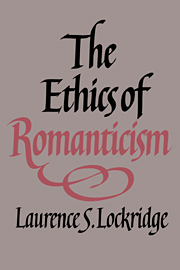Book contents
- Frontmatter
- Contents
- Acknowledgments
- Editions and abbreviations
- Introduction
- PART ONE THE WILL TO VALUE
- PART TWO AGENT, POWER, SCENE
- PART THREE THE PRESSURE OF REALITY
- 6 Shelley and the poetry of life
- 7 Hazlitt: common sense of a dissenter
- 8 Keats and the ethics of immanence
- 9 Byron: the world as glorious blunder
- 10 The ethical bearing of literature
- Select bibliography
- Index
9 - Byron: the world as glorious blunder
Published online by Cambridge University Press: 16 September 2009
- Frontmatter
- Contents
- Acknowledgments
- Editions and abbreviations
- Introduction
- PART ONE THE WILL TO VALUE
- PART TWO AGENT, POWER, SCENE
- PART THREE THE PRESSURE OF REALITY
- 6 Shelley and the poetry of life
- 7 Hazlitt: common sense of a dissenter
- 8 Keats and the ethics of immanence
- 9 Byron: the world as glorious blunder
- 10 The ethical bearing of literature
- Select bibliography
- Index
Summary
The authenticity of performance
Byron has often seemed anomalous in the family of British Romantics. Both Weltschmerz and satire seem incompatible with Wordsworthian remembrance and Keatsian appetite. But Byron is hardly alone in notable darkness and negativity – or satirical play. Keats sees more painfully than he the incommensurateness of desire to having; Coleridge expresses a profounder sense of evil; Blake's psychological warfare rivals the siege of Ismail in violence; Shelley's Mont Blanc exerts an even more forbidding necessity than Byron's ocean; Wordsworth voices a deeper sadness at loss and heart-wasting. A spirit of negation is found in them all and is not Byron's special counter to some euphoric romance of the imagination. And they all try their hand at satire.
Byron's distinctive character, ethically considered, is found elsewhere, and can be seen in his relationship to structures of Romantic thought and in his authorial stance and voice. Neither relativist nor nihilist, he has a resolute commitment to the values of energy, honesty, affection, courage, pleasure, and cash. At the same time he subverts a prevalent structure in Romanticism: dialectical movement, with its promise of dynamic change in persons and history. This subversion is a corollary to an ethically precise recognition that I find surprisingly consistent in his work: values exist in patterns of mutual exclusion.
- Type
- Chapter
- Information
- The Ethics of Romanticism , pp. 417 - 449Publisher: Cambridge University PressPrint publication year: 1989

